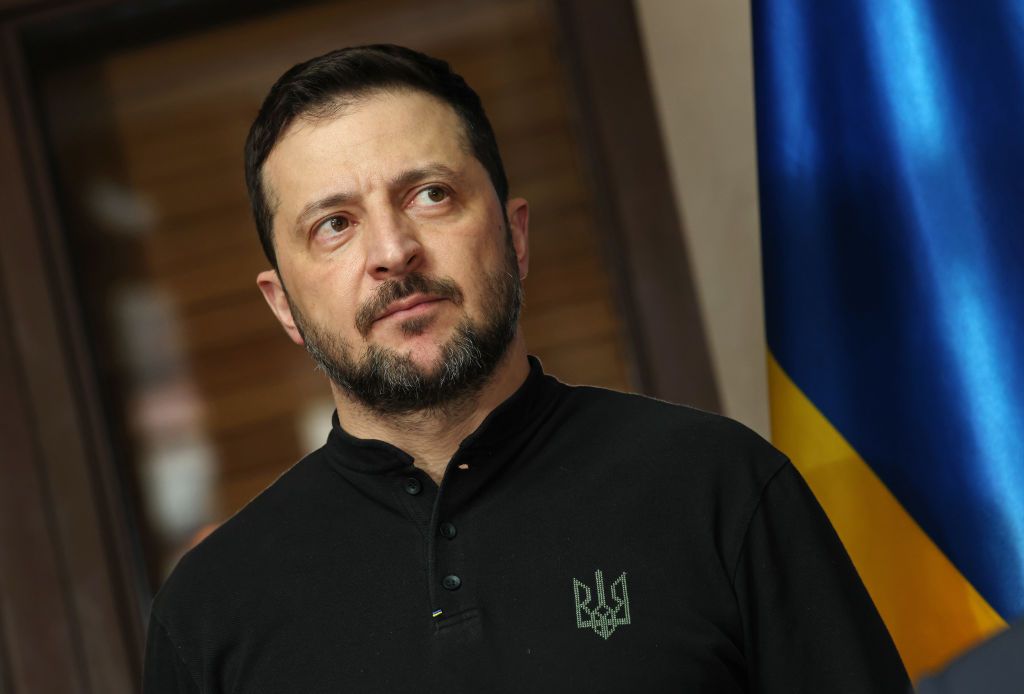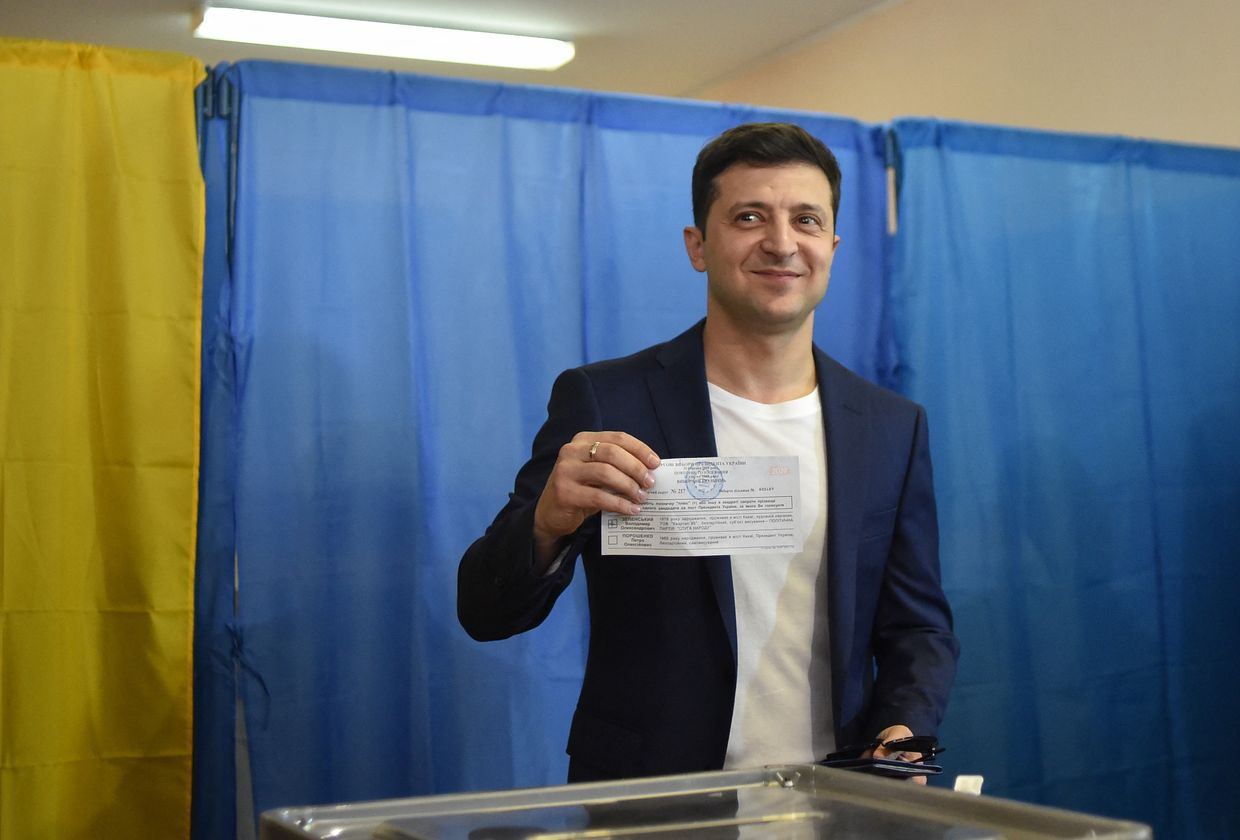How Ukraine should deal with Trump, according to Ukrainians

U.S. President Donald Trump holds a press conference at the White House in Washington, D.C., U.S. on Feb. 13, 2025. (Andrew Harnik / Getty Images)
Despite a long history of controversial and bombastic statements, U.S. President Donald Trump still managed to stun those watching this week by calling President Volodymyr Zelesnky a "dictator" and blaming Ukraine for Russia's full-scale invasion.
Trump's comments were the latest example of increasingly hostile rhetoric towards Ukraine that has, in recent days, become disturbingly close to long-standing Kremlin propaganda lines.
As well as the dictator comment, Trump has also criticized Zelensky for not holding elections, echoing comments from Moscow that have questioned the president's legitimacy.
All of this has come at the same time as a concerted push from the White House to end the war, which so far has taken the form of a high-level meeting in Saudi Arabia between U.S. and Russian officials — but not Ukraine's, adding to increasing fears that a peace negotiation could be reached that would be beneficial to Moscow at the expense of Kyiv.
On the streets of Kyiv on Feb. 19, opinions about Trump and his outbursts over recent days weren't hard to find.
"It's complete nonsense. I think he's either an idiot, or he's pretending to be one," Yevhen, a charity fund employee told the Kyiv Independent.
While blunt, the comment does highlight an important question — are Trump's personal attacks on Zelensky and Ukraine just that, or is there a wider strategy at play?
Benjamin Tallis, director of the Berlin-based Democratic Strategy Initiative, told the Kyiv Independent he believes there are three options.
The first, he says, is a strategy all about "putting the Europeans on notice."
"Saying, you need to toughen up, you need to take responsibility and to actually make a point in a way that has not been made before by effectively abandoning Europe," he said, adding this possibility is "looking increasingly unlikely" and Trump's cosying up to Putin suggests something else.
The second option could be that the Trump administration is looking at the wider geo-political situation, identifies China as its biggest threat, and is therefore trying to "split off Russia from China, to use Russia against China in the ongoing geopolitical competition."
"Ukrainians — and Zelensky personally — should absolutely not count on and not trust us now — this American administration is unpredictable, unreliable, and unhinged."
"But the thing that mitigates against that is it seems strange on many levels to embrace such an unreliable potential partner as Russia when you have what would be a much more obvious partner and a richer partner in Europe," he says.
Which leaves option three — that Trump has "moved over to the side, or embraced his position on the side of the dictators and the anti-freedom axis."
"And that's the nightmare scenario because that means that if Europe is in a systemic competition of free world versus the authoritarians of democracies versus dictatorships, we're basically on our own," Tallis said.
Marci Shore, author and professor of European intellectual history at Yale University, gave a similarly downbeat assessment of the situation, bluntly stating that "we're staring into a nihilist abyss."
"There are no first principles, no values, nothing beyond narcissism. Trump and Putin are alike in that the lives of other people mean absolutely nothing to them — which gives them both a free hand," she told the Kyiv Independent.
"Ukrainians — and Zelensky personally — should absolutely not count on and not trust us now — this American administration is unpredictable, unreliable, and unhinged. This applies both domestically and globally. I say this as an American filled with shame and disgust."
We asked three Ukrainian political experts how they think Ukraine should handle this very delicate, and hugely consequential moment.

Dr. Volodymyr Dubovyk
Expert on U.S.-Ukrainian relations and head of Odesa National University's Center for International Studies
I do not believe that this is some sort of sophisticated strategy here on Trump’s part. It is just Trump being Trump. He can’t stand anyone opposing him, or standing in his way.
Zelensky saying that Trump is wrong, even when he says that in the most reserved, polite way is bad enough for Trump. Only flattery works with him, but this is not a time for flattery if you are Ukraine’s leader.
Besides, he has a history with Ukraine and Zelensky, and that is a negative history. He is surrounded by people who have no regard for Ukraine. He is getting his view of Ukraine from people who wish it ill.
Initially, I suppose, Trump tried to appear fair and balanced. But he has a bad temper and no patience, so his intrinsic thinking came to the surface really quickly.
Zelensky is in a hard bind here — he cannot not react to Trump’s insinuations. Besides, he needs to position himself clearly with Ukraine’s interests in the current situation, in light of a high-speed rapprochement with Moscow. On the other hand, of course, he does not want to antagonize Trump.
That is why he appears animated and emotional, but still doing his best to be reserved and calm, not to cross certain lines.
It would be wise, I think, for President Zelensky not to dive into this vicious cycle of back-and-forth mocking and poking, trading accusations.
Perhaps, not all things Trump says call for a reproach.
Oleksandr Kraiev
Expert on North American policy at the foreign policy think tank Ukrainian Prism
When Zelensky and Trump first met in the US… he was very praising of Trump.
He was a good friend to him. So basically, Zelensky got it right on how to talk to Trump. And I do believe he should return to the strategy of interpersonal communication, of building bridges with Trump, of being his good buddy.
First and foremost, we should once again make it personal, but on the good side of Trump. So to some extent, we should play by Trump's playbook.
Of course, some may say it's a lame game to play, but if it provides weapons for Ukraine, if it provides security for Ukraine, and if it provides guarantees and a good deal for Ukraine, I don't care what means we use, we should save our country.
The second point is don't look weak. Trump will never deal with somebody who is weak, who is losing, who is getting prepared to lose, or who is just giving up on all positions. It's not about being only nice.
It's also about being a strong partner on whom Trump can rely, both economically, politically, security-wise, etc. We should play all our cards well. We should present all our pluses, especially the security and military ones.
Ukraine should use all the pluses that Ukraine has and then just work, work, work, constant communication, constant exchanges, and just be there, just be present in Trump's informational bubble.
Professor Oleksiy Haran
Research advisor at the Democratic Initiatives Foundation
If Trump believes Putin is ready to make peace and start negotiations, there is a high probability that because of the Russian approach — they are not flexible and will try to push, push, push — it may create a backlash from the United States, including from Trump himself.
And as we know, Trump can always change his mind on matters.
Right now he looks very disappointed by Zelensky, and is very aggressive towards him, repeating Russian arguments. But we don't know what will happen in one or two months' time.
So he may change his approach, and his approach to Russia may become harder, he may listen more carefully to Ukrainian arguments.
It's very difficult to predict, frankly speaking. We can only hope.












